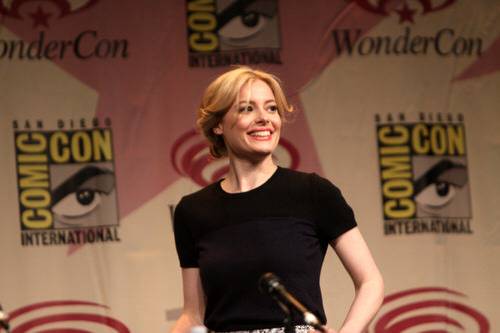
The namesake of last week’s big women-in-technology conference, the Grace Hopper Celebration of Women in Computing, was both a computer scientist and high-ranking naval officer who received plenty of accolades in her day. Yet no one has ever told Hopper’s story in a documentary. That’s about to change.
Gillian Jacobs, best-known as Britta Perry, the politically correct “buzzkill” on the NBC-to-Yahoo Screen sitcom Community, will direct the short film for Nate Silver’s FiveThirtyEight website. The as-yet-unnamed documentary is set to debut online by February 2015. (A second Hopper documentary by a separate production team is in the works, though it’s not slated for release until 2016.)
Jacobs didn’t start off knowing anything about the history of computing or major-yet-largely-invisible role of women in the early days of programming. Since taking the job, however, she’s become fascinated with the history of female programmers, and inspired to tell their story.
See also: History’s Female Programmers Will No Longer Be Forgotten
I caught up with Jacobs at the conference, where she was interviewing students, engineers, and historians about Hopper’s legacy and the huge advancements she and other female computer scientists ushered in.
A Learning Experience In Programming And Directing
ReadWrite: Have you always been interested in Grace Hopper or programming?
Gillian Jacobs: I had never heard of Grace Hopper before. So for me, it was a quick education, and I was lucky enough to speak with Joy Rankin, an academic on the history of computing and gender. I called her and said I was asked to do this piece on Grace Hopper, and asked what are her significant accomplishments, or a really interesting story from her life, and what was it like to be the only woman in tech in this era.
And she said, “She wasn’t the only woman in tech.”
That really blew my mind. And I started to read about the women of the ENIAC project who were her colleagues, and I was lucky enough to talk to Kathy Kleiman yesterday, who has done a whole documentary on the ENIAC.
It’s been really fun. I feel like there’s a lot of awareness right now, like with Walter Isaacson’s new book talking about Ada Lovelace and Grace Hopper and the women of ENIAC.
I’ve been teaching myself as much as I can about the very early days of computing, and Grace Hopper’s work on Mark I at Harvard, and with Eckhart-Mockley on the UNIVAC, and creating Flow-Matic and COBOL.
Initially when I read her Wikipedia page, I didn’t understand a word of it. But now I know what a compiler is, I understand what pseudo-code is. It’s been amazing to speak to such accomplished women in this field, and to talk to girls and young women just starting out in this profession.
I got to talk to Megan Smith, the CTO of America, yesterday. I feel so lucky to be here.
RW: Why did FiveThirtyEight reach out to you?
GJ: I’d been speaking with Dan Silver, who works with ESPN 30 for 30 Films. I was on a panel with him at the Tribeca Film Festival earlier this year. I’d been talking with him because I wanted to start doing things other than acting—directing producing, and diversifying myself in film and TV.
He was watching an episode of Halt and Catch Fire, the TV show, and they made a passing reference to Grace Hopper. He was like, “Who is Grace Hopper?” He looked her up and got really excited about her, and thought of me because we’d been talking about me directing something.
Now that I know about her, I can’t believe I didn’t know about her before.
The fun thing for me was that my mom works at Carnegie-Mellon University, and when I told her about this project, she was like, “I know Grace Hopper, my students go to the conference every year.” I interviewed one of my mom’s recent graduates for the documentary. My mom totally showed me up.
RW: Do you want to learn how to code now?
GJ: I’ve had a couple offers from people to teach me how to code. I think it would be fun.
It’s really exciting to learn about whole other fields for me. I’m a complete novice when it comes to this stuff, and I’m learning about so many other women in tech and computing, learning about Katherine Johnson who was doing work for NASA, to learning about Hedy Lamarr’s work during World War II, work that was used in submarines. The diversity of stories is incredible.
Forgotten Women In History
RW: What have you discovered about women in programming?
GJ: I think it’s really interesting to also talk about what computing was like during World War II because it created a lot of opportunities for women, because men were called into service. They had this need for people with strong mathematics backgrounds, so all these woman of the ENIAC were called into service at the University of Pennsylvania, speculating ballistics trajectories.
There was really no such thing as a programmer at that point. They were creating the job as they went along. They were problem-solving, trying to keep these massive computers running, the vacuum tubes were blowing out like every three to six minutes.
And the famous story of Grace Hopper and the story of debugging when they found a moth in the Mark II.
It was so difficult for them to just keep these machines operational at this point. From that to having a phone in your pocket that can do thousands of times what these machines can do.
RW: Through your research, have you found out why these women in history had been forgotten about, as opposed to men?
GJ: Kathy [Kleiman] had some interesting stories regarding the women of ENIAC. At the time, they did this public demonstration of the ENIAC computer after it was declassified, and so it was the successful demonstration, and everyone was so excited about the computer and its abilities, but in the newspaper, the women weren’t labelled in the photographs.
I think that for a long time, no one knew who these women were; they were thought to be models. They weren’t represented as programmers.
Because of Grace Hopper’s position in the Navy, and being promoted to rear admiral and retiring as one of the oldest people in active service, and having a destroyer named after her, she has a higher profile and awareness. But women like Betty Holberton and Jean Bartik were doing incredibly important work alongside her.
They worked on Flow-Matic and COBOL, which is incredibly important for business programming, even today, much to the chagrin of some people apparently.
These women were doing great work as well, but perhaps because they weren’t eventually rear admirals in the Navy, their stories were lost.
RW: What do you think is the most interesting thing you’ve learned about Grace Hopper so far?
GJ: Oh my gosh, so many things!
The fact that COBOL was the basis for like 80% of business programming language, and that she was so instrumental in its creation and its predecessor.
This isn’t specifically Grace Hopper, but learning the story about UNIVAC predicting election results so accurately, that the news dumbed down election results. Because they had Eisenhower winning by a landslide, and they wanted it to seem like a closer race, but the UNIVAC had already predicted them so accurately.
Which coincidentally mirrors Nate Silver’s work as a statistician. It was his predecessor by decades.
I think it’s so wonderful that Grace Hopper spent the last couple years of her career going out and giving lectures and inspiring young people. You talk to people today that still have their nanosecond she gave them [at events].
She was such a funny, witty woman with a great dry humor that made these really memorable TV appearances, whether it was Walter Cronkite or David Letterman.
A Documentary To Remember The Original Programmers
RW: What are you hoping this documentary will do?
GJ: I not only want to tell people about Grace Hopper, but remind them that she was not the only woman in her field in her era. Women have always been a part of tech and computing.
There’s a large effort right now to get more women in computer science fields and to retain them, because women either leave the major, or leave the profession within the first five to 10 years.
The very early days of computing were really exciting. I get goosebumps when I read about their work. It’s a compelling narrative.
RW: Do you feel different directing than acting?
GJ: It’s really fun to be behind the camera. I realize that I really like it. It’s fun to not be in hair and makeup every day, and just roll up in the morning.
I’m learning so much from these women. It’s great to feel challenged in a different way, use a different part of my brain, and go outside of my comfort zone.
RW: What future projects do you see yourself working on?
GJ: I’ve learned so many stories of other important figures in the history of computing. If they let me, I’d love to make the Katherine Johnson story, and the Hedy Lemarr story, and get everyone to watch Kathy Kleiman’s documentary on the ENIAC programmers.
RW: Do you feel like you’ll play a part in getting women programmers back into history books?
GJ: I don’t know about that, but I do know the Anita Borg Institute is doing great work, and the Grace Hopper Celebration is a really important time of year for women in this profession, and I’ve had several women and girls tell me that coming to this for the first time has really changed their lives.
Taking Community Online

RW: Some people thought you were here for Yahoo, because the next season of Community will now be streamed online, after being on NBC for years. Do you think it’s weird to have your show streamed online?
GJ: It makes complete sense to me. That’s how most of our audience was watching the show anyway. I don’t sit down at my TV at 8 p.m. on Thursday night, and I don’t know too many people who watch TV live like that anymore. For me, it seems like a natural fit.
Even before we were on Yahoo, we were a show that had one foot in the online world, and one foot in network TV. We were an uncomfortable fit for network TV almost.
I’m doing a show for Netflix after Community as well. I definitely see that’s where so much exciting programming and so many of the TV shows I’m loving right now are streamed, in that format.
I remember during the first season of Community, I went to a coffee shop and someone said, “Oh I love your show!” I told them there was a new episode that night, and she said “I don’t even know what night it’s on.”
We live and die on network TV by scheduling, what night you’re put on, what hour you’re put on, Nielsen ratings, all these things. It’s so irrelevant to most viewers these days. It’s kind of a relief to be on Yahoo and untethered from that.
Lead image by Gage Skidmore; Community actors photo by acin355









